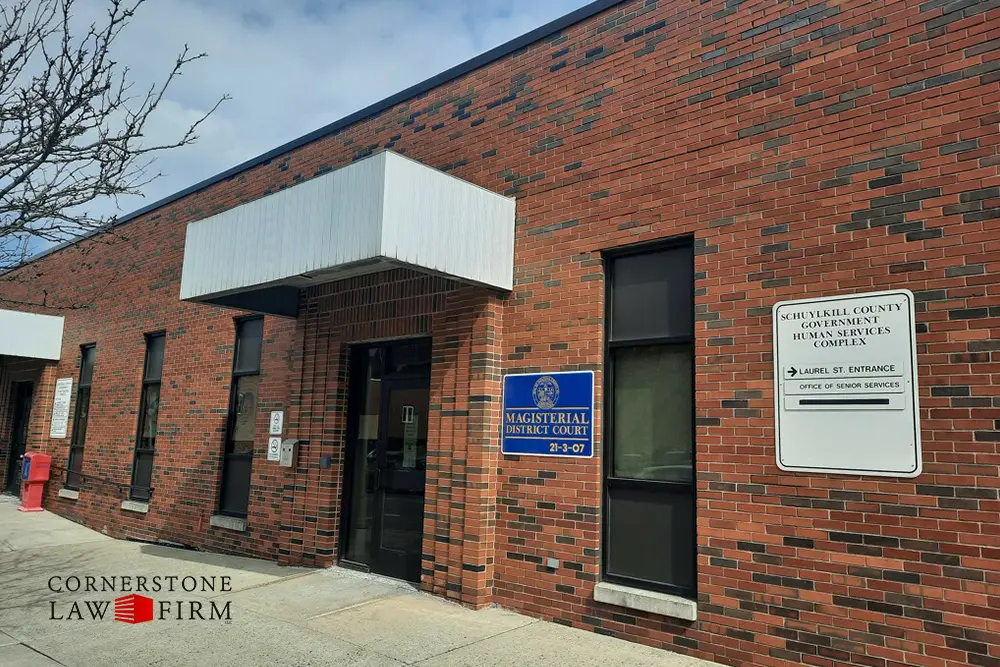
Criminal Defense Lawyers for Reading, Allentown, and Beyond
Don’t just plead guilty—fight your charges.
When you’ve been charged with a crime, you need excellent representation. Our criminal defense attorneys are able to help whether you need to go to trial or want the best outcome for your case through negotiations. Each case is different, but one thing that remains the same: the burden of proof is on the government to prove you are guilty. You have rights and those rights should be defended. Call us for a free consultation about your case and we’ll let you know how we can help.
Crimes in Pennsylvania
While there are technically a number of crimes that you can be accused of, some tend to be more common than others. Crimes we typically see include:
- Aggravated assault and Simple assault
- Arson
- Burglary and Trespassing
- Disorderly conduct
- Domestic violence
- Drug crimes
- DUI
- Harassment
- Homicide
- Indirect Criminal Contempt and violating PFAs
- Internet crimes
- Juvenile crimes
- Larceny and theft
- Sexual harassment and other sex crimes
- Terroristic threats and speech crimes
- Vandalism
- White collar / financial crimes including:
- Bribery
- Counterfeiting
- Forgery
- Fraud
- Identity theft
- Money laundering
If you have been accused of one or more of these crimes, or another type of crime, it’s important to contact a criminal defense attorney. Depending on the charges raised against you, some resolutions will carry lifelong consequences. Criminal charges can affect your immigration status, your reputation, your car insurance, and more. Don’t underestimate the power of a criminal charge. Call the attorneys at Cornerstone Law Firm today.
What are the different types of criminal charges?
Different criminal charges come with different levels of consequences. The general breakdown of charges includes summary offenses, 1st, 2nd, and 3rd degree misdemeanors, 1st, 2nd, and 3rd degree felonies and homicide charges. While any type of criminal record can leave a lasting impact, some consequences are less severe, and lowering your charges often results in a better outcome.
Summary Offenses
A summary offense is typically a type of civil offense. It can include crimes like harassment, disorderly conduct, trespassing, and underaged drinking, among other things. Summary offenses typically result in a fine of up to $300, but in some cases, they can result in a maximum of 90 days of jail time. Summary offenses are tried at the Magisterial District Court first and can later be appealed at the Court of Common Pleas.
Misdemeanors
A misdemeanor is a crime considered more serious than a summary offense but less serious than a felony. Pennsylvania has 3 grades of misdemeanors:
Third Degree Misdemeanor (M3): A third degree misdemeanor is the least severe misdemeanor charge. It can result in up to 1 year of jail time and a maximum fine of $2,500. Examples of 3rd degree misdemeanors include:
- Animal neglect
- Cyberstalking
- Buying alcohol with a fake ID
- Possession of marijuana
- Invasion of privacy
- and more
Second Degree Misdemeanor (M2): A second degree misdemeanor is the middle grade, less serious than a 1st degree and more serious than a 3rd It can result in up to 2 years of jail time and a maximum fine of $5,000. Examples of 2nd degree misdemeanors include:
- Simple assault
- Bigamy
- Witness retaliation
- Reckless endangerment
- False police reports
- and more
First Degree Misdemeanor (M1): A first degree misdemeanor is the most severe grade of misdemeanor. It can result in up to 5 years of jail time and a maximum fine of $10,000. Examples of 1st degree misdemeanors include:
- Terroristic threats
- Multiple DUIs
- Stalking
- Child endangerment
- Carrying a firearm without proper licensing
- and more
Felonies
A felony charge is reserved for the most severe types of crime. Like misdemeanors, Pennsylvania has 3 grades of felonies as well. They are:
Third Degree Felony (F3): A third degree felony is the least severe type of felony. It can result in up to 7 years of jail time and a maximum fine of $15,000. Examples of 3rd degree felonies include:
- Bribery
- Fleeing and eluding an officer
- Drug possession with intent to distribute
- Certain gun crimes
- Perjury
- and more
Second Degree Felony (F2): A second degree felony can result in up to 10 years of jail time and maximum fine of $25,000. Examples of 2nd degree felonies include:
- Sexual assault
- Certain types of involuntary manslaughter
- Aggravated assault
- Indecent assault
- Certain types of burglary
- and more
First Degree Felony (F1): A first degree felony is the most severe type of felony under Pennsylvania law. You can receive anywhere from 10 to 20 years of jail time, with a maximum of life imprisonment. Fines can reach a maximum of $25,000. Examples of 1st degree felonies include:
- Kidnapping
- Rape
- Aggravated assault with a deadly weapon
- Home burglary
- Arson that has endangered a person
- and more
Homicide Charges
Of all criminal charges in Pennsylvania, homicide charges are the worst. They grade above first degree felony charges and carry the most severe punishments. If you are found guilty of a homicide charge, you will receive a substantial fine and jail time, possibly up to life in prison. Some homicide charges can even result in the death penalty. Similar to misdemeanors and felonies, homicide charges are broken down into different grades:
First Degree Murder: First degree murder is the most serious murder charge, sometimes called Murder 1. If charged with Murder 1, Pennsylvania must prove that there was “malice aforethought,” or premeditation involved.
Second Degree Murder: Second degree murder is a little less straightforward. It is sometimes called the “felony murder rule. It essentially states that all parties involved in committing a felony can be charged with murder if one of the co-conspirators murders someone during the felony.
Third Degree Murder: Third degree murder covers the other types of murder that do not fit into the first two categories. It can include killing in the heat of the moment, killing as part of “imperfect” self-defense, or killing as a crime of passion.
No matter the grade of your criminal charge, it’s best to consult with an experienced criminal defense attorney as soon as possible. While some verdicts can be appealed, it is often better to contest a criminal charge before any decisions are reached or agreements are made. If you have been charged with a summary offense, misdemeanor, felony, or homicide, contact Cornerstone Law Firm today.
Cornerstone Law Firm offers free consultations for criminal defense cases. If you have been accused of a crime, contact us today.
Preliminary Arraignments & Preliminary Hearings
After you’ve been charged with a crime in Pennsylvania, you will have to attend two hearings: a preliminary arraignment and a preliminary hearing. They both take place at a Magisterial District Court.
A preliminary arraignment is the first step toward prosecuting an individual for a crime. At the arraignment, you will go in front of a judge. The judge will set bail, read your charges, and ask for your contact information, which will then be added to the county’s system so the Court can contact you for future hearings.
A preliminary hearing is the second hearing you will attend. This hearing typically takes place in the same court as your preliminary arraignment, about a week or two later. At the preliminary hearing, the Commonwealth will put on its case against you. The judge will get a first look at the Commonwealth’s case to determine whether or not there is probable cause. If the judge decides the charges are not completely lacking merit, your charges will be “bound over” to the Court of Common Pleas.
Both of these hearings are important for different reasons. Your preliminary arraignment will allow you to hear the charges for the first time and obtain a copy of the Affidavit of Probable Cause. You may also advocate for unsecured bail. The preliminary hearing is an opportunity for your attorney to discuss your case with the prosecution. Negotiations for plea deals and other outcomes can be made. In some cases, all charges can be dropped at a preliminary hearing. In other cases, waiving a preliminary hearing may lead to a more favorable deal from the prosecution.
Having an experienced criminal defense lawyer by your side is crucial during preliminary arraignments and hearings. If you have questions about your hearings or your charges, contact Cornerstone Law Firm and we will gladly discuss your case with you.
Assault Charges
In the Commonwealth of Pennsylvania, there are two levels of assault charges that can be brought against an individual. They are aggravated assault and simple assault.
Aggravated Assault
Aggravated assault is one of the most serious crimes you can be charged with in Pennsylvania. It is considered a felony, usually of the first or second degree. If you are charged with aggravated assault, you will be accused of having done one of the following things:
- Intentionally or recklessly causing or attempting to cause serious bodily injury.
- Attempting to cause serious bodily injury to a cop or other certain protected government employee.
- Attempting to cause bodily injury to government employees.
- Attempting to cause bodily injury with a deadly weapon.
- Attempting to cause bodily injury to a teacher or school employee.
- Attempting to put a public employee in fear of imminent serious bodily injury.
- Using tear gas or a taser against a cop or public employee.
- Attempting to cause bodily injury to a child who is less than 6 years old.
- Attempting to cause serious bodily injury to a child who is less than 13 years old.
Serious bodily injury (sometimes referred to as SBI) is a term that is frequently used in the aggravated assault statute. It does not have a specific definition, but often refers to “an injury which causes permanent impairment of a major bodily function.”
Simple Assault
Simple assault charges are considered less serious than aggravated assault charges. Even so, they are often charged together. Simple assault is typically considered a second degree misdemeanor but can be a third degree if you have engaged in “mutual combat” with another person. If you are charged with simple assault, you will be accused of having done one of the following things:
- Intentionally or recklessly causing or attempting to cause bodily injury.
- Negligently causing bodily injury with a deadly weapon.
- Threatening imminent serious bodily injury.
- Attacking police with needles.
Whether you are charged with assault, it is extremely important to have an experienced criminal defense attorney by your side. Criminal defense attorneys, like the ones at Cornerstone Law Firm, can offer counsel on plea agreements, defend your case in a jury trial, and fight to prove your innocence.
Domestic Violence
Unlike other criminal charges, domestic violence does not have one specific definition in Pennsylvania. It can encompass a range of crimes including but not limited to:
- physical abuse
- sexual abuse
- emotional abuse
- financial abuse
- psychological abuse
Because of the wide range of crimes that can be considered domestic violence, charges can also range in severity. They may be considered any grade of misdemeanor or felony depending on the details of the case.
In order for a crime to fall under the domestic violence umbrella, it must be committed against someone with whom you have a domestic relationship. This may be a family member, like a parent or child, or a romantic partner, like a dating partner, spouse, or former spouse. It can also include roommates.
Pennsylvania does not require law enforcement to obtain a warrant before making an arrest if they have reason to believe domestic violence has occurred. It is not unheard of for police to make false domestic violence arrests. If you have found yourself in this situation, contact the criminal defense attorneys at Cornerstone Law Firm for help.
Indirect Criminal Contempt
If you have been charged with domestic violence, it is likely that the alleged victim will file a Protection from Abuse order, also known as a PFA. Similar to restraining orders, a PFA’s main goal is to stop contact between the accused abuser and the alleged victim. If you are charged and someone files a PFA against you, it is important to follow that PFA, even if you are working towards proving your innocence in the domestic violence case.
Violating a PFA can result in an Indirect Criminal Contempt (ICC) charge. This charge alleges that you are in contempt of Court by violating the Court order. Unlike other criminal charges, ICC charges do not first go through preliminary hearings, but are often resolved by either a “bench trial” (where a judge decides the case rather than a jury) or a plea agreement. While most ICC charges result in nothing more than a fine, some can lead to probation and even jail time. It can also complicate other legal processes, like reviewing the PFA, custody disputes, or divorce actions.


Drug Charges
Drug charges vary from case to case. They can be charged as less severe misdemeanors or more severe felonies depending on whether the defendant was attempting to deliver or sell drugs, the quantity of drugs discovered in the defendant’s possession, and more
The most common types of drug charges include:
- Possession—In most cases, simple possession will be charged as a misdemeanor. This can vary, however, depending on the type of drug(s), amount, and any previous charges on the defendant’s record.
- Possession with intent to distribute (PWID)—PWID can include both the actual intent to distribute drugs and possessing a certain quantity of them, even if the intent was personal use. PWID is often charged as a felony and comes with harsher consequences than possession charges.
- Distributing drugs—The distribution of drugs is charged as a felony and can come with heavy fines and jail time.
- Forging prescriptions—Forging a prescription to obtain drugs is often charged as a felony.
- Possession or sale of drug paraphernalia—Drug paraphernalia charges are often added on to other drug charges. This type of charge is typically considered a misdemeanor.
- Manufacturing of drugs—Manufacturing drugs is probably the worst drug-related charge. It is tried as a felony and can lead to serious fines and decades of jail time depending on the case.
Drug Schedules
The severity of misdemeanor and felony drug charges can vary depending on the type and amount of drugs involved. Drugs are categorized into different “schedules” based on how addictive they are and whether they have an accepted medical use. There are 5 schedules.
Schedule I: These are drugs with a high potential for abuse and no accepted medical use in the United States. Examples include:
- Heroin
- marijuana
- LSD
- MDMA (ecstasy)
- Peyote
Schedule II: These are drugs with a high potential for abuse and a restricted medical use. Examples include:
- Opioids like Oxycontin, Vicodin, and Percocet
- Methamphetamines
- Cocaine
- Ritalin
- Adderall
Schedule III: These are drugs with a moderate potential for abuse and an accepted medical use. Examples include anabolic steroids, Ketamine, and certain medications containing codeine.
Schedule IV: These are drugs with a low potential for abuse and an accepted medical use. Examples include Benzodiazepines like Xanax and Valium, and some prescription sleep aids.
Schedule V: These are drugs with a low potential for abuse and an accepted medical use. Examples include cough medicines containing codeine.
If you are charged with a drug crime, contact the criminal defense attorneys at Cornerstone Law Firm. Even misdemeanor drug charges can lead to jail time, large fines, and a loss of driver’s license. An experienced criminal defense lawyer can keep you informed of your rights, provide insight on plea bargains, and fight your charges.
DUI
In Pennsylvania, you can be charged with driving under the influence (DUI) if your blood alcohol content is above a certain level. The level will vary based on biological factors, such as your sex and weight, and situational factors, like how quickly you’ve consumed alcohol and whether or not you’ve eaten while drinking. PennDOT has a chart for adults aged 21 and older to measure blood alcohol content.
It’s important to note that DUIs do not just apply to alcohol. You can also be charged with a DUI if you have marijuana present in your system. This covers both medical use of marijuana and recreational use. With drug use, it doesn’t matter if you are presently intoxicated or not. Drugs leave behind chemicals in the body called “metabolites.” Metabolites can stay in the body much longer than the time the impairment lasts. If you have any metabolite in your blood—even if that metabolite doesn’t actually impair you—you can be found guilty of a DUI.
If you have been charged with a DUI as a first-time offender, you will likely be required to pursue treatment. Two or more DUIs will lead to harsher penalties like fines, points on your driver’s license, and possible driver’s license suspension or revocation.
If you’ve been charged with a crime, it’s important to know your rights. Contact the attorneys at Cornerstone Law Firm to discuss your case and get the legal representation you need.
Harassment Charges
In Pennsylvania, harassment charges are often considered to be either summary offenses or misdemeanors. While these two grades of criminal charges are on the less severe end, it’s important to remember that criminal charges of any kind can follow you for life.
Harassment as a Summary Offense: Pennsylvania’s criminal code defines harassment as a summary offense when the defendant:
- Hits or kicks someone, or tries to hit or kick them.
- Stalks someone in a public place.
- Repeatedly commits actions that have no purpose beyond harassment.
- Says, writes, or draws something dirty or obscene about someone.
Harassment as a Misdemeanor: The code defines harassment as a misdemeanor when the defendant:
- Communicates repeatedly through anonymous means (blocked phone numbers, unsigned notes, etc.).
- Continues calling or ringing a doorbell at disrespectful times.
- Communicates repeatedly when asked to stop.
Sexual Harassment
Unlike other forms of harassment, sexual harassment is typically considered a civil issue instead of a criminal one. Whether it takes place at work, at school, or in another setting, sexual harassment includes unwelcomed or unwanted sexual comments, sexual advances, or requests for sexual favors. Lewd jokes, suggestive looks, or sharing explicit images can also fall under the umbrella of sexual harassment.
Sexual harassment becomes a criminal issue when it moves beyond inappropriate comments into inappropriate touching. That will change the charges from harassment to assault.
Whether you’ve been accused of harassment or sexual harassment, having an experienced defense attorney can help. The attorneys at Cornerstone Law Firm will work on your behalf to lower charges and fight for your innocence. Contact us today.
Larceny and Theft
Larceny, theft, robbery, and burglary are all terms people use when referring to stealing or taking something that does not belong to them. There are, however, differences for each of these in regard to criminal charges and the consequences they carry.
Theft refers to the taking of property. This may include stealing from individuals, businesses, or other organizations.
Larceny is a type of theft that occurs when one individual steals another individual’s personal property. This may include wallets, purses, cars, or other items.
Robbery refers to stealing from an individual by force or threat of force.
Burglary refers to an individual breaking and entering a building, car, or other type of structure. Stealing does not have to occur for a burglary to be charged.
Both theft and larceny can be charged as either misdemeanors or felonies depending on the amount of property stolen. Robbery and burglary are both felonies and carry harsher penalties.
If you have been accused of stealing—whether its theft, larceny, robbery, or burglary—contact the attorneys at Cornerstone Law Firm. We can help to explain your charges, inform you of your rights, and defend your innocence. Call us today.
Speech Crimes
Under the First Amendment, speech should never be criminalized. However, the reality is that defendants are regularly charged for what they say. While many people may take offense to certain kinds of comments, that does not mean a speech crime has been committed. The First Amendment gives a broad right to speak freely, meaning you should not be charged with a crime for saying something that someone else doesn’t like. There are, however, limited exceptions to First Amendment protections.
Typically, the kind of speech that can be categorized as a speech crime includes threats, incitement to violence, and hate speech that leads to threats or incitement to violence. A threat is when a person expresses the intent to do harm to someone or something. Making threats of violence or harm to individuals, businesses, or organizations is against the law. Inciting violence occurs when a person encourages others to engage in violent or criminal behavior. And, lastly, hate speech is any type of speech intended to intimidate or degrade a person or people group based on things like gender, ethnicity, race, sexual orientation, or other characteristics.
The Supreme Court of the United States has recognized that the government can prove certain exceptions to the First Amendment, such as disclosures of military secrets, “true threats,” and limited other examples.
If you have been accused of a speech crime, contact Cornerstone Law Firm. Our criminal defense attorneys are well-versed in the First Amendment and will work to uphold your rights and defend your innocence.
White Collar Crimes
White collar crimes refer to nonviolent financial crimes. These types of crimes are typically committed by businesspeople, hence the nickname “white collar crime.” There are a number of crimes that can fall under this category, including:
- Bribery—Bribery is the act of offering or soliciting something of value in exchange for an illegal or unethical favor, influence, or other action. Bribes can take the form of cash, expensive gifts, job offers, political donations, or preferential treatment.
- Counterfeiting—Counterfeiting is the act of producing or distributing imitation goods or currency with the intent to deceive. Counterfeiting can take the form of producing fake money, knockoff luxury goods, or knockoff electronics.
- Forgery—Forgery is the act of creating or altering a document or signature to change its meaning, to deceive, or to defraud. Forgery can take the form of fake checks, fake legal documents, fake ID cards, art forgeries, fake historical artifacts, and more.
- Fraud—Fraud is the act of intentionally deceiving or misrepresenting to gain something personally or to harm someone else. Fraud can take the form of financial fraud, insurance fraud, or consumer fraud.
- Identity theft—Identity theft is sometimes considered a type of fraud. It is the act of using someone’s personal identifying information to open accounts, take out loans, make purchases, or obtain some other type of benefit.
- Money laundering—Laundering money is the act of disguising criminal proceeds as legitimate income. It can be used for funding further criminal acts or avoiding financial regulations.
The penalties for white collar crimes can vary depending on which crimes are involved and how much money is at play. If you are found guilty of any of them, you will likely receive some kind of fine and some amount of jail time.
If you have been charged with a financial crime, contact the criminal defense attorneys at Cornerstone Law Firm today.
Contact us for a free consultation about your case and we’ll let you know how we can help.
Juvenile Crimes
While minors can be charged with similar crimes as those of an adult, the justice system looks different for minors. Rather than the traditional penalties seen when adults are tried, juvenile justice puts a greater emphasis on rehabilitation and education, doling out resolutions like community service, counseling, fines, or probation.
Common crimes committed by juveniles include:
- Assault
- Disturbing the peace
- DUI
- Harassment
- Possession of drugs or alcohol
- Possession of stolen property
- Possession of weapons
- Theft
- Trespassing
- Vandalism
Minors who are charged with sex crimes or murder will face more severe consequences and are more likely to be tried as an adult. Unlike less severe juvenile crimes, these more severe crimes can lead to incarceration and a lifelong criminal record.
If you are the parent or guardian of a minor who has been charged with a crime, contact Cornerstone Law Firm. We can review your child’s case, represent them at any necessary hearings, and work for their best interest.


Accelerated Rehabilitative Disposition (ARD)
Pennsylvania has a program known as Accelerated Rehabilitative Disposition or ARD. It is a program for first-time, non-violent offenders that allows for alternate punishments and results in a record expungement at the end of the process. Not everyone is eligible for ARD, and only a District Attorney can offer it to you. Participating in ARD does not mean you will be absolved of paying fines. ARD can last between anywhere from 6 months to 2 years depending on your charges. The biggest benefit that ARD brings is the record expungement. If you are accepted into the ARD program and complete all requirements, you will no longer have a criminal record.
Although this may sound like an appealing option, ARD is not for everyone. It is a one-time offer and, depending on your case, it can sometimes be a bad decision to apply for it. The criminal defense attorneys at Cornerstone Law Firm can help you determine whether or not ARD would be a good solution for your case. Call us today and let us help you navigate your individual situation.
Expungement
Pennsylvania offers expungement of criminal records for eligible individuals. Expungement is the erasing or sealing of criminal records from public view. This means that employers, landlords, and other people seeking to do a background check will not be able to see your criminal record. Not everyone will be eligible for expungement, but those who are may have better opportunities for education, employment, and housing after the process is complete.
Eligibility
Crimes that are eligible for expungement are typically lower level crimes, like summary offenses, misdemeanors, and juvenile crimes.
- For summary offenses, you must be free of arrest or conviction for at least 5 years after your summary offense to be considered.
- For third degree misdemeanors, you must be free of arrests or convictions for between 7 and 10 years from your initial misdemeanor.
- For second degree misdemeanors, you must’ve been under the age of 25 when you were convicted, and you must be free of arrests or convictions for between 7 and 10 years.
- If you are 70 years old or older, you may be eligible for expungement if you have been free of arrests or convictions for the previous 10 years.
Not all second degree misdemeanors are eligible for expungement. Some, like assault, sex crimes, and animal cruelty, will be considered ineligible.
How to File for Expungement
In order to receive an expungement of your criminal record, you must gather relevant information about your arrest and form a Motion for Expungement petition. Once you have done so, you may file the petition with the Court of Common Pleas in the county where your charges were filed. You may need to submit a copy of your petition to the Attorney General for approval. Once your petition is at the Court of Common Pleas, a judge will review it and decide whether or not you should receive expungement. If your petition is approved, your record will be expunged. If it is not approved, you may want to consider other avenues, like requesting a pardon.
If you would like to file a petition for expungement, contact Cornerstone Law Firm. We can help you gather the necessary information, write the petition, and file it so you can move forward without a criminal record.

Criminal charges are a serious matter and can lead to serious consequences. Even if you are guilty, you have a right to receive legal representation and ensure that your constitutional rights are upheld. Contact Cornerstone Law Firm for a free consultation about your criminal defense case and fight your charges to receive the best outcome possible.
Additional Resources
For additional resources about criminal defense, check out these links:
- An Overview of Pardons in Pennsylvania
- Are there any consequences to ARD?
- Does a treatment plan effect my drug or alcohol charges?
- Is a cop’s word enough to convict me?
- Pennsylvania’s Criminal Code
- Three reasons why you shouldn’t try to handle criminal charges on your own
- Timeline for Criminal Trials
- Veterans Court
- Accelerated Rehabilitative Disposition (ARD)
- Charged with a DUI in Pennsylvania
- Defending against Animal Abuse Charges
- Defending against Aggravated Assault Charges
- Defending against Burglary Charges
- Defending against Disorderly Conduct Charges
- Defending against DUI Charges
- Defending against Harassment Charges
- Defending against Indirect Criminal Contempt Charges
- Defending against Public Drunkenness Charges
- Defending against Shoplifting Charges
- Defending against Simple Assault Charges
- Filing a Counter Protection from Abuse (PFA)
- How the Police Can Prove You’re Drunk in DUI Cases
- Preliminary Arraignment vs. Preliminary Hearing
- What is a Summary Offense?
- Why am I charged with terroristic threats?
